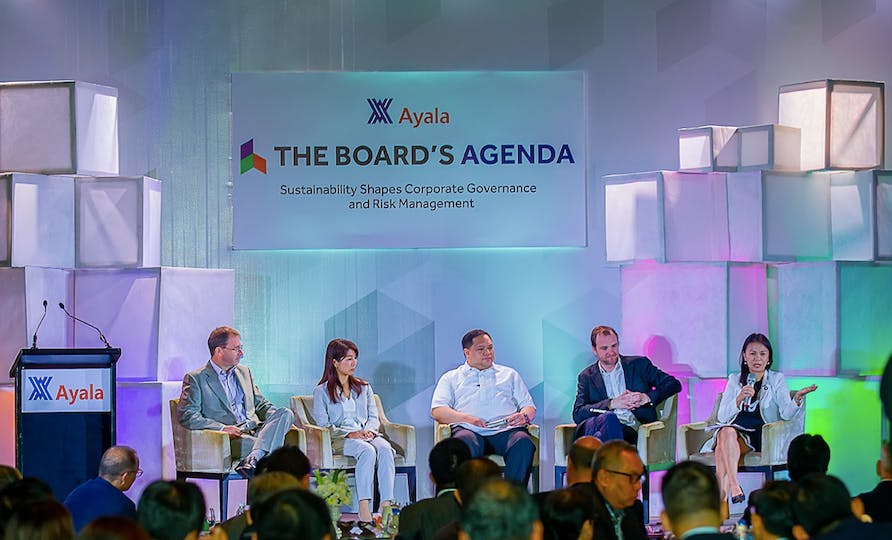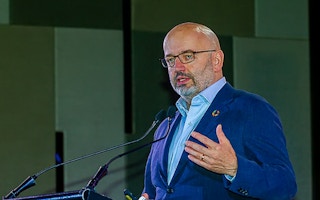Peter Bakker, president and chief executive officer of the World Business Council for Sustainable Development (WBCSD), posed a tough question for businesses leaders at a recent sustainability summit in the Philippines: what are you doing to cut carbon emissions?
With the United Nations Climate Action Summit coming up in September, which aims to set tougher targets for the world to meet a 2040 deadline to radically cut greenhouse gas emissions to keep global warming in check, investors will be asking CEOs this same question, he said.
“The way investors make decisions is changing. Every leader will be asked what they are doing to decarbonise. The integration of risk management, sustainability and governance principles into your business is the only way to get that done,” Bakker said in his keynote address to a gathering of 400 leaders at Ayala Corporation’s sustainability summit held in Manila last Friday.
Bakker, who heads the CEO-led organisation of 200 businesses to develop solutions to challenges such as energy efficiency and low-carbon transport, said sustainability should drive businesses in how they create value.
The former CEO of Netherlands-based delivery and logistics company TNT NV cited how businesses like US-based Impossible Burger are aiming to feed a population heading for 10 billion people by 2050 with healthy diets within planetary boundaries. Last year the meat alternative supplier launched in Asia, where almost half of the world’s meat eaters live.
“
Sustainability used to only be about the environment, but now it deals with social and human aspects. If corporates get this right, they can tap into big business opportunities.
Peter Bakker, president, World Business Council for Sustainable Development
He also pointed to the development of Xiong’an as China’s model for green urbanisation, with its aim to be a city without overcrowding, pollution and traffic congestion, and powered only by clean energy.
Bakker added that on the part of the Philippines, Ayala Corp becoming the first Filipino company to be a member of WBCSD signals a “big transformation” for the country in sustainable development. The conglomerate’s membership will allow its participation at global climate forums where the country’s “voice is not loud enough”, he said.
Ayala Corp, Bakker added, was the world’s first company to make the link between risk management, sustainability and governance, which was the overarching theme of the conference.
The Philippines, a risky place to do business
More Filipino companies are expected to integrate sustainability into their strategies after the Philippines Securities and Exchange Commission’s (SEC) issued sustainability reporting guidelines for publicly-listed companies in February.
By April 2020, companies will have to report their ESG performance to regulators, or explain why they have failed to do so.
Currently, less than 22 per cent of publicly-listed companies in the country report their sustainability impacts and performances, according to SEC.
Eco-Business managing editor Jessica Cheam, who moderated the panel discussion, said this was a sobering figure, since out of 172 countries, the Philippines ranks as the third riskiest place to do business, according to the 2017 World Risk Index report.
“How will you ensure that companies comply with these regulations and do not just treat them as a tick-the-box exercise?” she asked.

Panel from left: Ben Ridley, director and deputy global head of sustainability affairs, Credit Suisse Hong Kong; Miho Kurosaki, head of Japan and Korea Research, Bloomberg NEF; Ephyro Luis B. Amatong, SEC commissioner, Dominic Thurbon, partner, climate change & sustainability services, Ernst & Young Australia; Jessica Cheam, managing editor, Eco-Business. Image: Ayala Corp.
Investors are now demanding that local companies demonstrate how they are managing risk in a climate-vulnerable country like the Philippines, said Ephyro Luis B. Amatong, SEC commissioner. Research organisations have already been hired by asset managers to measure a company’s ESG rating along with the measurement of stock market performance, he added.
“Researchers look at whatever is out there about your company—such news reports, or press releases on environmental action. If you are not communcating effectively, they will come to their own conclusions. Whether you like or not, you are being scored,” Amatong told the panel.
“That is why we have introduced regulations for sustainability reporting. We want to help you communicate to stakeholders what you are doing to manage the challenges of doing business in the third riskiest country in the world.”
The commisioner warned traditional businesses that a growing number of large companies, many of them WBCSD members, have committed to decarbonise the global economy by 2040. A shift in the financial markets has helped, he added. Responsible investment portfolios worth US$21 trillion 10 years ago are worth $82 trillion now, he noted.
Amatong said: “If organisations like WBCSD succeed, then transport, energy delivery, and provision for food are among the systems that will undergo transformative change. Business as usual models will be rendered obsolete by the successful transition to a low carbon economy. That’s why we want you to report on sustainability.”


















